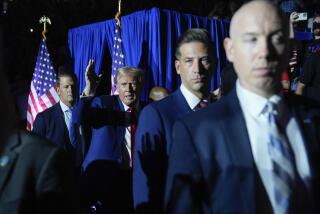In New Hampshire, Mitt Romney makes it formal: He’s in
- Share via
Reporting from Stratham, N.H. — The Republican presidential contest heated up Thursday, as Mitt Romney formally launched his candidacy from a windswept Yankee farm amid intensifying criticism from potential rivals.
In his second try for the nomination, Romney, 64, is casting himself as a seasoned crisis manager for a nation “in peril.” He laced his remarks with a sharp attack on President Obama, pledging to spark an American economic revival by slashing federal spending, lowering business taxes and balancing the budget.
“I’m Mitt Romney. I believe in America, and I’m running for president of the United States,” the former Massachusetts governor said to cheers from several hundred supporters.
In keeping with the casual style of his 2012 campaign, he spoke, shirtsleeves rolled, from a flatbed trailer, a stiff breeze fluffing his swept-back black hair. He was introduced by his wife, Ann, as he was when he declared his candidacy in his native Michigan four years ago.
This time, Romney is better known and leading in national polls, though the vast majority of Republican voters have yet to focus on the race. A shifting field of foes is already taking aim, showing no qualms Thursday about stepping on his big day.
Before he finished speaking, Sarah Palin had rolled into a nearby New Hampshire town, trailed by the phalanx of reporters and cameras that has tracked her bus up the East Coast this week. Two other potential GOP candidates, Rudolph W. Giuliani and Thaddeus McCotter, a Michigan congressman, were also competing for media and voter attention in the state.
Romney tried to take the developments in stride. Asked by a reporter about the former Alaska governor’s arrival, he said: “I think it’s great. New Hampshire is action central today.”
Palin, whose flirtation with a presidential run isn’t taken seriously by most GOP strategists, swung hard at Romney’s healthcare record, perhaps his biggest vulnerability in the nomination fight. Conservatives are strongly opposed to the Massachusetts medical insurance requirement Romney signed into law as governor, which became a model for the national mandate enacted by Obama and congressional Democrats last year.
“In my opinion, any mandate coming from government is not a good thing,” Palin said during a stop in Massachusetts before heading north. Giuliani, the former New York mayor who competed for the Republican nomination in 2008, echoed her criticism in a speech in North Conway, N.H.
In his remarks, which lasted no more than 20 minutes, Romney referred fleetingly to the Massachusetts healthcare system, defending it as “a state solution” to the problem of the uninsured.
For the most part, he zeroed in on the general election, avoiding Republican foes and primary campaign topics — such as abortion — that were part of his 2008 announcement speech.
“Barack Obama has failed America,” Romney said. “Mr. President, you’ve had your turn.”
He blamed the incumbent for prolonging the economic downturn and making it worse. Romney assailed what he described as Obama’s “distrust” of Israel, uncertain response to the democratic awakening in Arab countries and flawed Afghanistan policy, which he said aided the Taliban by setting a date for withdrawal of U.S. troops.
In a nod to primary campaign issues, Romney said he would teach Washington to respect the Constitution, echoed the “tea party” movement’s emphasis on states’ rights and called for repeal of Obama’s healthcare law. He promised to cap federal spending at 20% of national economic output, a deep cut that tracks the House Republican budget, though he did not say when or how he would reach that goal.
The invitation-only announcement ceremony, billed as a “cookout with Mitt and Ann,” was held on the Scamman family’s “Bittersweet Farm,” a familiar GOP campaign stop in a prosperous community not far from the coast. Volunteers ladled out free bowls of chicken chili, prepared with a Romney family recipe, from tables set up on a rolling field adjoining a BMW dealership.
Romney’s launch site was closely tied to his 2012 strategy, which relies heavily on winning New Hampshire, next door to the state he governed and home to one of his personal residences (others are in the Boston suburbs and La Jolla). The state, which hosts the first primary in the nominating contest, is friendlier to establishment Republicans than other early-voting states, where social conservatives are more dominant.
In 2008, New Hampshire helped sink Romney’s White House hopes. He lost it to eventual nominee Sen. John McCain in an upset, after an expensive investment of time and money. This time, polls show Romney far ahead, though Granite State voters have a penchant for confounding expectations.
Romney supporters, in interviews, were more concerned about unseating Obama than about fending off other Republicans. But at least one man seemed mindful of the coming GOP fight.
Robert Burnham of Palm Harbor, Fla., said Romney had the ability to provide the “good, stable government leadership” needed in Washington.
“The only place where he is weak is on Massachusetts healthcare. I think he should say it was wrong,” said the 79-year-old retiree. “That’s the point he’s got to straighten out.”
More to Read
Sign up for Essential California
The most important California stories and recommendations in your inbox every morning.
You may occasionally receive promotional content from the Los Angeles Times.













